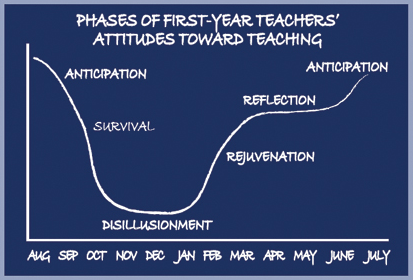
It’s October, and Success Academy teachers are officially settled into the school year — time to break out the holiday sweaters and plan a weekend to pick pumpkins! Ironically, studies show that this time of year tends to bring on the “teacher blues”— a time when teachers might especially feel the weight of their workload, or even feel a little discouraged. We asked veteran teachers to share how they reboot when the days start getting shorter, and they offered up some valuable tips and tricks on how to push through. Whether you’ve been in the classroom for a few weeks or a few years, we hope you find these eight tips helpful.
It’s Not Personal! Change Your Attitude Toward Feedback
My first year, I was so hard on myself whenever I got negative feedback, which peaked around October. During one of my first field trips, I remember feeling like my Lead Teacher (LT) was particularly harsh towards me, telling me I should’ve paid more attention to my scholars. The next day, I obsessed over the feedback — I was convinced she thought I was a terrible teacher and that we would no longer be able to work well together. But that turned out not to be the case at all. It turns out that, most of the time, feedback is not personal. I realized my LT was just trying to help my growth in that specific situation, and it didn’t mean I was a bad teacher. Now, I look forward to feedback and view it as a challenge to push me to be a better teacher and person. The second I flipped that switch, everything was a little less overwhelming.
—Anabel Schmelz, teaching five years, fourth grade teacher at SA Bed-Stuy 1
Make Time For Yourself
When you’ve finished your work, leave. Bring a coworker with you — to yoga, to dinner, to a Broadway show. And try to talk about anything other than work. When you’re in a slump, it becomes so easy to talk about how much work you might have or how miserable you feel, which makes things even more painful. When you develop relationships and a life outside of work, it’ll make coming back the next day that much more enjoyable.
—Agatha Cummings, teaching seven years, third grade teacher at Hell’s Kitchen
Schedule Daily “Recharge” Sessions
When I first started, I thought I had to fill every free minute with intense planning. While of course planning is important, I learned very quickly that this was not sustainable — and it left me battling pure exhaustion! Now, I make sure to set aside ten minutes every day to meditate or unwind. When I jump back in, I feel much more ready to tackle the day’s challenges.
—Adelaide Bullock, teaching seven years, kindergarten teacher at SA Harlem 2
Bounce Ideas Off Each Other
Whenever I feel stuck or overwhelmed, I remind myself I can lean on my fellow teachers for advice and perspectives, too — not just my managers. I’ll invite another teacher to pop into my classroom, even just for a minute. If they see that something isn’t working, they’ll suggest another approach. Even in those times when I am discouraged, these people can often see the bright spots in my lesson that I can’t see myself! Getting that perspective from a veteran teacher is so encouraging and freeing.
—Aleah Tarnoviski, teaching eight years, kindergarten teacher at Harlem 6
Get Some Helpers
For me, it was at the start of my second year around October that I began to feel overwhelmed.
Each day, I was working well past 6pm, swamped by what seemed like the never-ending, non-teaching tasks of a teacher. I’d observed that other teachers saved time by getting their scholars involved with simple tasks, so I decided to try it out with the basics. So I announced the names of scholars who would be “table captains” or part of the “clean up crew.” Over the next few days, I watched in amazement as my first graders fulfilled these responsibilities perfectly and even began to volunteer to wipe down the tables — they wanted to be a part of this! Giving my students work — not just school work, but actual tasks — was an incredible time-saver and also had other unexpected and profoundly positive effects.
—Hannah Inglut, teaching six years, now assistant principal at SA Springfield Gardens
Read more about Hannah’s classroom management tip here.
Don’t Underestimate the Importance of Sleep
The absolute best piece of advice I can give to get through the October blues is to get to bed at a reasonable time. I used to stay up until midnight regularly, but during my first year it clicked with me that I needed to be in bed by 10pm. It was hard at first, but I will say that being well-rested made it easier to handle my stress.
—Kirsten Anderson, teaching six years, first grade teacher at SA Bushwick
Find Joy In Little Moments With Your Scholars
One year, I had a scholar in my class who just hated coming to school. Every morning, I’d pull her aside to give her a huge smile, a hug, and a pep talk about having a great day. I didn’t think it was working — until one day, I read the personal narrative she wrote in class. In it, she told the story of how, even though she often felt too tired to go to school, I made her feel comfortable and confident enough to push through. That when I hugged her, she knew it would all be okay. Moments like these help me rediscover my “why” and help me get through my blues. You might not have a moment like this with every student, but there is something inside of each student that you’re going to love, value, and cherish, and when you take time to appreciate these qualities, you’ll feel reenergized.
—Anabel Schmelz, teaching five years, fourth grade teacher at SA Bed-Stuy 1
Know That This is Only a Phase — It Will Get Better!
I’m constantly telling my teachers to remember that feeling discouraged at this time of year is so normal that it has actually been documented as a pattern by researchers! This research reveals the fact that not only are October and November a recurring period of disillusionment for teachers, but also that teachers who stick it out usually experience what’s called “The Rejuvenation Phase” in late winter and spring when they feel more confident and start looking forward to the next semester. Reach out to your more veteran peers and ask them what they’re doing or have done to get through the hard times, so when you’re feeling the gloom and doom, you’ll know that you’re not some anomaly—and most importantly, that it does not reflect your capacity and potential as a teacher.
—Liz Vandlik, principal at Hudson Yards Middle School
Cover photo: Agie Cummings and class











